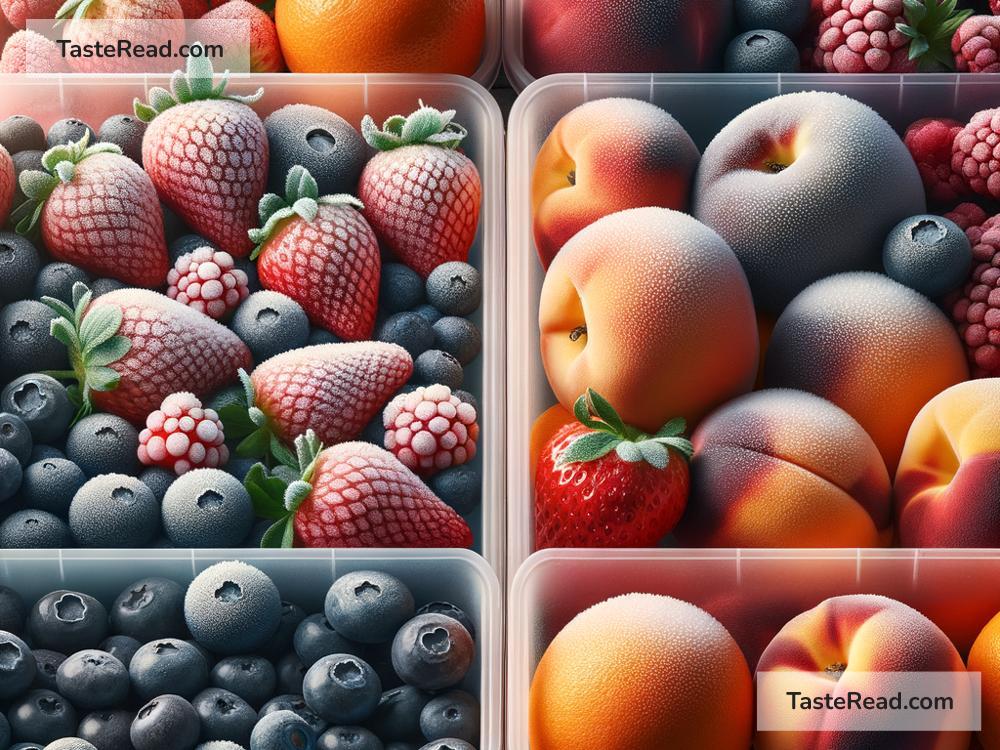How Storage Temperature Influences Fruit Flavor
We’ve all experienced it: biting into a juicy peach that’s bursting with flavor, or eating an apple that tastes a little bland. Did you know that how you store fruit can make a big difference in how it tastes? The storage temperature has a major impact on a fruit’s flavor, texture, and overall quality. In this blog, we’ll explore this fascinating relationship between storage temperature and flavor, while keeping things simple and easy to understand.
Why Does Storage Temperature Matter?
Fruit is a living thing, even after it’s picked from the tree. It continues to breathe, ripen, and change over time. This process, called respiration, releases energy that can affect the fruit’s flavor. When fruit is stored at the wrong temperature, it can over-ripen, become bland, or lose its unique taste altogether.
Storage temperature also plays a role in preserving the fruit’s sugars, acids, and compounds that make it flavorful. Too cold or too warm, and these important elements can break down or change. This is why it’s so important to store fruit at the right temperature.
The Role of Cold Storage
Cold storage is a great way to keep fruit fresh, but it isn’t suitable for all types of fruit. For most fruits, refrigeration slows down the ripening process. This means the fruit retains its flavor for longer. However, some fruits are sensitive to colder temperatures and can lose their flavor if stored in the fridge.
For example, bananas are tropical fruits that dislike the cold. When stored in the fridge, they can turn brown and lose their sweet, creamy flavor. On the other hand, berries, grapes, and apples do excellent in cold storage. The cooler temperature keeps them crisp and flavorful.
Fun fact: Even in cold storage, fruits like apples continue releasing ethylene gas, which speeds up the ripening of nearby fruits. This is why you sometimes see bananas turning soft faster when stored next to apples!
Don’t Freeze Your Flavor
While refrigeration can be good for some fruits, freezing is another story. Freezing fruit changes the texture completely. Once frozen, the water inside the fruit expands and forms ice crystals, which breaks the cell walls. When the fruit defrosts, these broken walls cause the fruit to lose its firm texture and sometimes its flavor.
For instance, frozen strawberries may taste watery or mushy compared to fresh ones. However, freezing is a great way to store fruit for smoothies, jams, or baking, where texture isn’t as important. You can freeze mangoes, peaches, and berries like blueberries without losing too much of their flavor when used in recipes.
Room Temperature Storage
Certain fruits thrive when stored at room temperature. Fruits like peaches, nectarines, plums, and pears ripen perfectly on your countertop. Room temperature allows these fruits to develop their sugars, acids, and aromas, bringing out their best flavor.
But timing is everything! If left at room temperature for too long, they can become overripe, mushy, or even spoil. So once they’re perfectly ripe, you can move them to the fridge to slow down the ripening process and keep them fresh a little longer.
Cool, But Not Too Cold
For some fruits, like tomatoes and avocados, refrigeration is tricky. These fruits often lose their flavor when stored in the fridge. Tomatoes, for example, stop producing sugars when exposed to cold temperatures. This leads to bland, tasteless tomatoes. Avocados stored too early in the fridge can take much longer to ripen or lose their creamy texture.
The best solution? Keep these fruits at room temperature until they’re ripe. Once ripe, you can refrigerate them to extend their shelf life for a few more days.
Citrus Fruits: The Exception
Citrus fruits like oranges, lemons, and limes are resilient and respond well to different storage temperatures. You can store them in the fridge or at room temperature without much impact on flavor. If you want them to last longer, refrigeration is the better choice.
Tips for Storing Fruit
To maximize flavor, follow these general storage tips:
-
Know your fruit: Understand whether your fruit prefers cold storage, room temperature, or a combination of both.
-
Don’t overcrowd: Store fruits in a way that allows air circulation to avoid spoilage.
-
Keep ethylene-sensitive fruits separate: Fruits like apples release ethylene gas, so store bananas, peaches, and other sensitive fruits away from them.
-
Check your fruit regularly: Pay attention to ripening, so you can move them to the fridge when needed.
-
Avoid washing before storage: Washing adds moisture, which can lead to faster spoilage. Only wash right before you’re ready to eat.
In Conclusion
Storage temperature may sound like a simple detail, but it has a big effect on fruit flavor. Cold temperatures can preserve certain fruits longer while room temperature helps others ripen to perfection. By storing your fruit correctly, you can enjoy maximum flavor, texture, and freshness. Next time you buy fruit, take a moment to consider how you’ll store it. Your taste buds will thank you!


